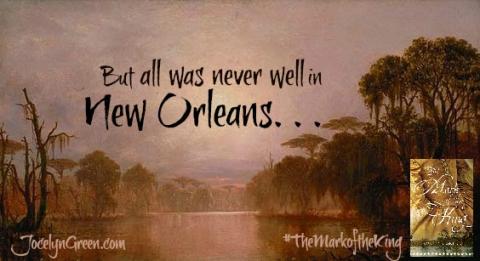
Decades before Marie Antoinette entered the scene, France was already in a desperate position. In 1714, the nation lost a thirteen-year war which had drained the royal coffers and disillusioned most of its military. Soldiers returning home had a hard time finding work. The weather hadn’t been cooperating with the farmers, driving rural people in to the cities to find other ways of earning a living. The streets of Paris teemed with poor.
The monarchy didn’t like it. Vagabonds and the unemployed were arrested and thrown into prisons to keep them off the street. Prostitutes, too, cycled in and out of jail, and back in, and back out again. The capital city was rife was poverty, crime, and vice.
Meanwhile, the French colony of Louisiana was practically dormant. After being claimed for France in 1699, the War of Spanish Succession soon tied up all of France’s resources, leaving the military outposts in Louisiana so bereft they would have starved to death had friendly native Americans not fed them and allowed them to winter in their villages. Now, the French king decided it was time for Louisiana to refill the French treasury, the way Mexico’s riches were making Spain wealthy.
 At the time, the territory of Louisiana stretched from Rockies to the Appalachians, from the Gulf Coast to the Great Lakes. Populating it proved to be a monumental task they never really mastered.
At the time, the territory of Louisiana stretched from Rockies to the Appalachians, from the Gulf Coast to the Great Lakes. Populating it proved to be a monumental task they never really mastered.
When not enough French volunteered to settle the land—despite promises of gold, silver, fertile land and abundant game—France forced immigration.
“We believe that We can do nothing better for the good of our State than to condemn [convicts] to the punishment of being transported to our colonies . . . to serve as laborers.”
~Royal Policy of France, January 8, 17191
Prisoners sentenced to the galleys were commuted to Louisiana instead. To relieve overcrowded prisons, they also sent military deserters, prostitutes, vagabonds who had been plucked from the streets after curfew. Because the men needed women to reproduce new settlers, shiploads of orphans and female convicts were sent over.
In September of 1719, 184 female convicts were told to choose grooms from the same number of male convicts. They were forced to marry in a mass wedding ceremony, shackled two-by-two, and put onto the ship that would take them to Louisiana.
The forced colonization scheme grew so out-of-hand that Mississippi bandoliers even began pulling people from the streets if they could not prove their employment. Riots broke out between the people and those charged with arresting them, resulting in injury and loss of life.
After three years of the forced immigration (1719-1722), the crown finally decreed it unlawful. By then, however, Jean-Baptiste Bienville, governor of Louisiana, had his hands full managing the settlers France had sent.
“It is most disagreeable for an officer in charge of a colony to have nothing more for its defense than a bunch of deserters, contraband salt dealers, and rogues who are always ready not only to desert you but also to turn against you.”
~Sieur Jean-Baptist Le Moyne de Bienville, 17192
It was under these conditions and with these challenges that Bienville founded New Orleans. With such a fascinating historical backdrop, I could not resist telling the tale of the people who struggled to survive and settle this town. The Mark of the King will bring you right into the middle of it all. Enjoy!
Psst! For a free excerpt, video pronuncation guide and give-away (open til Feb. 16, 2017), hop over to my previous blog post here!
For further reading:
To learn more about this colorful chapter in American (and French) history, I’ll direct you to the two books which proved so helpful to me in my own research: Building the Devil’s Empire: French Colonial New Orleans by Shannon Lee Dawdy, and Indians, Settlers & Slaves in a Frontier Exchange Economy by Daniel H. Usner.
Sources:
1. The Louisiana Purchase Bicentennial Series in Louisiana History, Volume 1: The French Experience in Louisiana, edited by Glenn R. Conrad. (Lafayette, LA: Center for Louisiana Studies, University of Southwestern Louisiana), 115.
2. Ibid., 132.


Comments
This is a part of history I'd
Add new comment